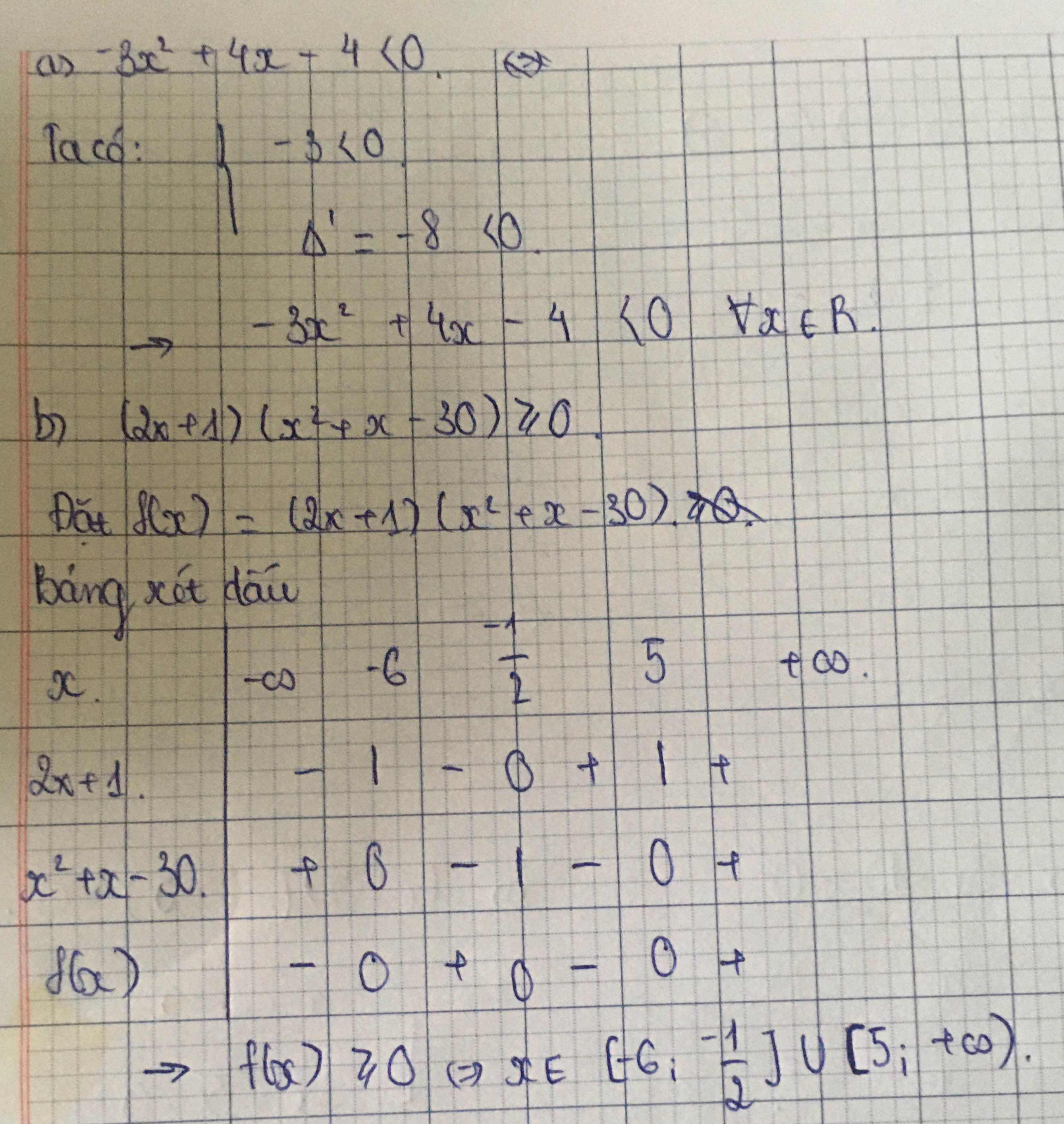3x2-7-4x=0

Những câu hỏi liên quan
Tìm cặp số (x;y) thỏa:
a) x2 + 3y2 - 4x + 6y + 7 = 0.
b) 3x2 y2 + 10x - 2xy + 26 = 0.
c) 3x2 + 6y2 - 12x - 20y + 40 = 0.
a: \(x^2+3y^2-4x+6y+7=0\)
\(\Leftrightarrow x^2-4x+4+3y^2+6y+3=0\)
\(\Leftrightarrow\left(x-2\right)^2+3\left(y+1\right)^2=0\)
\(\Leftrightarrow\left(x,y\right)=\left(-2;1\right)\)
Đúng 0
Bình luận (0)
b. 4x2 +4x+1=0 d. 5x2 6x1=0 a. 2x2-5x+1=0 c. -3x2 +2x+8=0 e. -3x2+ 14x - 8=0 g. -7x2 +4x-3=0
a. 2x2-5x+1=0
△= b2 - 4ac = (-5)2 - 4*2*1 = 17 ⇒√△ = √17
\(\Rightarrow x_1=\frac{5+\sqrt{17}}{4};x_2=\frac{5-\sqrt{17}}{4}\)
Vậy .... S={\(\frac{5\pm\sqrt{17}}{4}\)}
b. 4x2 +4x+1=0
⇔(2x+1)2 = 0 ⇔ x=\(\frac{-1}{2}\)
c. -3x2 +2x+8=0
△' = b'2 - ac = 12 - (-3)*8 = 25 ⇒√△ = 5
\(\Rightarrow x_1=\frac{-1+5}{-3}=-\frac{4}{3};x_2=\frac{-1-5}{-3}=2\)
Vậy... S={-\(\frac{4}{3}\);2}
d. 5x2 6x1=0 (thiếu dấu nên mk chưa giải được)
e. -3x2+ 14x - 8=0
△' = b'2 - ac = 72 - (-3)*(-8) = 25 ⇒ √△ = 5
⇒\(x_1=\frac{-7+5}{-3}=\frac{2}{3};x_2=\frac{-7-5}{-3}=4\)
Vậy .... S={\(\frac{2}{3};4\)}
g. -7x2 +4x-3=0
△' = b'2 - ac = 22 - (-7)*(-3) = -17<0
Vậy pt vô nghiệm , S=∅
Đúng 0
Bình luận (4)
Bài 7: Giải phương trình : a)( x- 2x + 3 ) ( 2x - x+6 ) =18
b) 3x3 + 6x2 –4x = 0
c) 3x2 – 5x = 0
d) – 2x2 + 8 = 0
a: \(\Leftrightarrow\left(-x+3\right)\left(x+6\right)=18\)
\(\Leftrightarrow-x^2-6x+3x+18-18=0\)
\(\Leftrightarrow-x\left(x+3\right)=0\)
=>x=0 hoặc x=-3
b: \(\Leftrightarrow x\left(3x^2+6x-4\right)=0\)
\(\Leftrightarrow\left[{}\begin{matrix}x=0\\3x^2+6x-4=0\end{matrix}\right.\Leftrightarrow\left[{}\begin{matrix}x=0\\x^2+2x-\dfrac{4}{3}=0\end{matrix}\right.\)
\(\Leftrightarrow\left[{}\begin{matrix}x=0\\\left(x+1\right)^2=\dfrac{7}{3}\end{matrix}\right.\Leftrightarrow x\in\left\{0;\dfrac{\sqrt{21}}{3}-1;\dfrac{-\sqrt{21}}{3}-1\right\}\)
c: =>x(3x-5)=0
=>x=0 hoặc x=5/3
d: =>(x-2)(x+2)=0
=>x=2 hoặc x=-2
Đúng 0
Bình luận (0)
Giải phương trình bằng cách đưa về phương trình tích :
3x2 + 2x - 1 = 0
x2 - 5x + 6 = 0
3x2 + 7x + 2 = 0
x2 - 4x + 1 = 0
2x2 - 6x + 1 = 0
3x2 + 4x - 4 = 0
3x2 + 2x - 1 = 0
=> 3x2 + 3x - x - 1 = 0
=> 3x(x + 1) - (x + 1) = 0
=> (3x - 1)(x + 1) = 0
=> \(\orbr{\begin{cases}3x-1=0\\x+1=0\end{cases}}\)
=> \(\orbr{\begin{cases}x=\frac{1}{3}\\x=-1\end{cases}}\)
x2 - 5x + 6 = 0
=> x2 - 2x - 3x + 6 = 0
=> x(x - 2) - 3(x - 2) = 0
=> (x - 3)(x - 2) = 0
=> \(\orbr{\begin{cases}x-3=0\\x-2=0\end{cases}}\)
=> \(\orbr{\begin{cases}x=3\\x=2\end{cases}}\)
3x2 + 7x + 2 = 0
=> 3x2 + 6x + x + 2 = 0
=> 3x(x + 2) + (x + 2) = 0
=> (3x + 1)(x + 2) = 0
=> \(\orbr{\begin{cases}3x+1=0\\x+2=0\end{cases}}\)
=> \(\orbr{\begin{cases}x=-\frac{1}{3}\\x=-2\end{cases}}\)
Đúng 0
Bình luận (0)
1, \(3x^2+2x-1=0\Leftrightarrow3x^2+3x-x-1=0\)
\(\Leftrightarrow3x\left(x+1\right)-\left(x+1\right)=0\)
\(\Leftrightarrow\left(x+1\right)\left(3x-1\right)=0\)
\(\Leftrightarrow\orbr{\begin{cases}x+1=0\\3x-1=0\end{cases}\Leftrightarrow\orbr{\begin{cases}x=-1\\x=\frac{1}{3}\end{cases}}}\)
2, \(x^2-5x+6=0\Leftrightarrow x^2-2x-3x+6=0\)
\(\Leftrightarrow x\left(x-2\right)-3\left(x-2\right)=0\)
\(\Leftrightarrow\left(x-2\right)\left(x-3\right)=0\)
\(\Leftrightarrow\orbr{\begin{cases}x-2=0\\x-3=0\end{cases}\Leftrightarrow\orbr{\begin{cases}x=2\\x=3\end{cases}}}\)
3, \(3x^2+7x+2=0\Leftrightarrow3x^2+6x+x+2=0\)
\(\Leftrightarrow3x\left(x+2\right)+\left(x+2\right)=0\)
\(\Leftrightarrow\left(x+2\right)\left(3x+1\right)=0\)
\(\Leftrightarrow\orbr{\begin{cases}x+2=0\\3x+1=0\end{cases}\Leftrightarrow\orbr{\begin{cases}x=-2\\x=-\frac{1}{3}\end{cases}}}\)
Đúng 0
Bình luận (0)
\(x^2-4x+1=0\)
\(\Leftrightarrow\left(x^2-4x+4\right)=3\)
\(\Leftrightarrow\left(x-2\right)^2=3\)
\(\Leftrightarrow x=\sqrt{3}+2;x=2-\sqrt{3}\)
\(2x^2-6x+1=0\)
\(\Leftrightarrow4x^2-12x+2=0\)
\(\Leftrightarrow\left(2x-3\right)^2=7\)
\(\Leftrightarrow x=\frac{\sqrt{7}+3}{2};x=\frac{3-\sqrt{7}}{2}\)
\(3x^2+4x-4=0\)
\(\Leftrightarrow3x^2-2x+6x-4=0\)
\(\Leftrightarrow\left(x+2\right)\left(3x-2\right)=0\)
\(\Leftrightarrow x=-2;x=\frac{2}{3}\)
Đúng 0
Bình luận (0)
Giải các phương trình sau:a)
x
−
1
3
x
−
5
;b)
x
+
1
2
+
1
x
+
3...
Đọc tiếp
Giải các phương trình sau:
a) x − 1 = 3 x − 5 ;
b) x + 1 2 + 1 x + 3 = 0 ;
c) 3 x 2 − 4 x − 7 = 0 ;
d) 7 x − 1 2 x + 1 + 2 x + 1 x 2 − 1 = 0 .
x3-3x2-4x+12=0
\(x^3-3x^2-4x+12=0\Leftrightarrow\left(x+2\right)\left(x-3\right)\left(x-2\right)=0\)
\(\Leftrightarrow\left[{}\begin{matrix}x=-2\\x=3\\x=2\end{matrix}\right.\)
Đúng 0
Bình luận (0)
\(x^3-3x^2-4x+12=0\)
\(\Leftrightarrow x^2\left(x-3\right)-4\left(x-3\right)=0\)
\(\Leftrightarrow\left(x-3\right)\left(x-2\right)\left(x+2\right)=0\)
\(\Leftrightarrow\left[{}\begin{matrix}x=3\\x=2\\x=-2\end{matrix}\right.\)
Đúng 0
Bình luận (0)
giải bất phương trình:
a) -3x2 + 4x - 4 <0 b) (2x + 1) ( x2 +x - 30) ≥ 0
c) 4x + 10x + 6
Bài 1. Cho hai đa thức f(x)= 4x4-5x3+3x+2 và g(x)= -4x4+5x3+7. Trong các số -4; -3; 0 và 1, số nào là nghiệm của đa thức f(x) và g(x).
Bài 2. Cho hai đa thức f(x)=-x5+3x2+4x+8 và g(x)= -x5-3x2+4x+2. CMR đa thức f(x)-g(x) không có nghiệm
Bài 1
Gợi ý bạn làm : Bạn thay \(x=-4;x=-3;x=0;x=1\) vào \(f\left(x\right);g\left(x\right)\)
\(\Rightarrow\) Nếu kết quả ra giống nhau thì là nghiệm , ra khác nhau thì không là nghiệm
VD : Thay \(x=-4\) vào \(f\left(x\right)\) và \(g\left(x\right)\)
\(f\left(-4\right)=4.\left(-4\right)^4-5\left(-4\right)^3+3.\left(-4\right)+2=1334\)
\(g\left(x\right)=-4.\left(-4\right)^4+5\left(-4\right)^3+7=-1337\)
Ra hai kết quả khác nhau
\(\Rightarrow x=-4\) không là nghiệm
Bài 2
\(f\left(x\right)-g\left(x\right)=\left(-x^5+3x^2+4x+8\right)-\left(-x^5-3x^2+4x+2\right)\\ =-x^5+3x^2+4x+8+x^5+3x^2-4x-2\\ =\left(-x^5+x^5\right)+\left(3x^2+3x^2\right)+\left(4x-4x\right)+\left(8-2\right)\\ =6x^2+6\\ =x^2+1\\ =x^2+2.\dfrac{1}{2}x+\dfrac{1}{4}+\dfrac{3}{4}\\ =\left(x+\dfrac{1}{2}\right)^2+\dfrac{3}{4}>0\forall x\)
\(\Rightarrow\) phương trình vô nghiệm
Đúng 1
Bình luận (0)
3x2+4x-7=0 A/ chứng tỏ phương trình có 2 nghiệm phân biệt B/ không giải phương trình, hay tính giá trị của biếu thức 2x1-(x1-x2-x1x2(
a) Do a = 3; c = -7 nên a và c trái dấu
Vậy phương trình luôn có hai nghiệm phân biệt
b) Theo Viét ta có:
x₁ + x₂ = -4/3
x₁x₂ = -7/3
Ta có:
2x₁ - (x₁ - x₂ - x₁x₂)
= 2x₁ - x₁ + x₂ + x₁x₂
= x₁ + x₂ + x₁x₂
= -4/3 - 7/3
= -11/3
Đúng 1
Bình luận (1)
\(3x^2+4x-7=0\)
\(a,\) Để pt có 2 nghiệm phân biệt thì \(\Delta>0\Rightarrow4^2-4.3.\left(-7\right)=100>0\)
Vậy pt có 2 nghiệm phân biệt \(x_1,x_2\)
\(b,\)Theo Vi-ét, ta có :
\(\left\{{}\begin{matrix}x_1+x_2=-\dfrac{b}{a}=-\dfrac{4}{3}\\x_1x_2=\dfrac{c}{a}=-\dfrac{7}{3}\end{matrix}\right.\)
Ta có : \(2x_1-\left(x_1-x_2-x_1x_2\right)\)
\(=2x_1-x_1+x_2-x_1x_2\)
\(=x_1+x_2-x_1x_2\)
\(=-\dfrac{4}{3}-\left(-\dfrac{7}{3}\right)\)
\(=-\dfrac{4}{3}+\dfrac{7}{3}\)
\(=\dfrac{3}{3}=1\)
Vậy giá trị của biểu thức là \(1\)
Đúng 0
Bình luận (1)





























